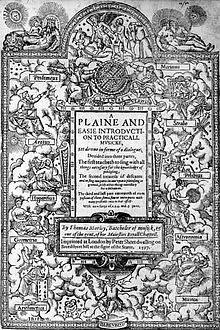Thomas Morley
Thomas Morley (* 1557 or 1558 probably in Norwich ; † October 1602 in London ) was an English composer , musicologist and organist of the Renaissance .
In 1588, Morley, who was a student of William Byrd , received a Bachelor of Music degree from Oxford . From organist at St Paul's Cathedral in London, he rose to gentleman at the Chapel Royal . He held this office from 1592 until his death.
In addition to the cheerful and appealing character of his pieces, his advocacy of Italian music, which was quickly gaining importance in England, played a decisive role in his success. The widespread circulation of Morley's works in print reflects its importance today, for example the pieces April is in my mistress' face from 1594 and Now is the month of maying from 1595 are still two of the most famous English madrigals today . Mount Morley on Alexander I Island in Antarctica has been named after him since 1961 .
Works (selection)
Secular works
All works, which of course are not completely preserved, were printed in London.
- Canzonets or Little Short Songs to Three Voyces (1593)
- Madrigalls to Foure Voyces (1593)
- The First Booke of Ballets to Five Voyces (1595)
- The First Canzonets to Two Voyces (1595)
- Canzonets or Little Short Songs to Two Voyces (1597)
Spiritual works
- The Whole Booke of Psalmes, With Their Woonted Tunes ( ca.1599 )
- Three Services and an Anthem for John Barnard's The First Book of Selected Church-Musick (published 1641)
Furthermore, other hymns (anthems), twelve motets , and pieces for the virginal have been handed down in handwritten form.
Theoretical works
- A Plaine and Easie Introduction to Practicall Musicke, Set Downe in Forme of a Dialogue (1597)
literature
- Alfred Baumgartner: Propylaea World of Music - The Composers - A lexicon in five volumes . Propylaen Verlag, Berlin 1989, ISBN 3-549-07830-7 , pp. 87/88, volume 4 .
Web links
- Works by and about Thomas Morley in the catalog of the German National Library
- Works by and about Thomas Morley in the German Digital Library
- Sheet music and audio files by Thomas Morley in the International Music Score Library Project
- Sheet music in the public domain by Thomas Morley in the Choral Public Domain Library - ChoralWiki (English)
- Biography in Goldberg Magazine (English) ( Memento of 29 September 2007 at the Internet Archive )
| personal data | |
|---|---|
| SURNAME | Morley, Thomas |
| BRIEF DESCRIPTION | English composer |
| DATE OF BIRTH | 1557 or 1558 |
| PLACE OF BIRTH | Norwich |
| DATE OF DEATH | October 1602 |
| Place of death | London |
